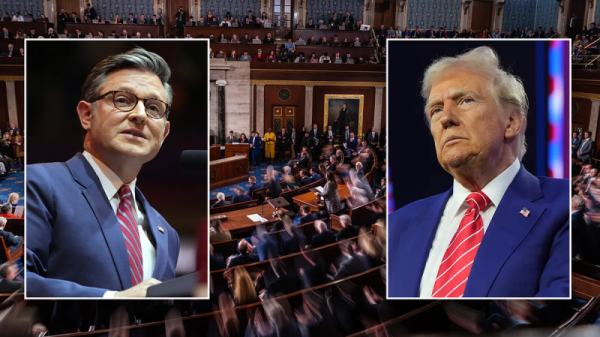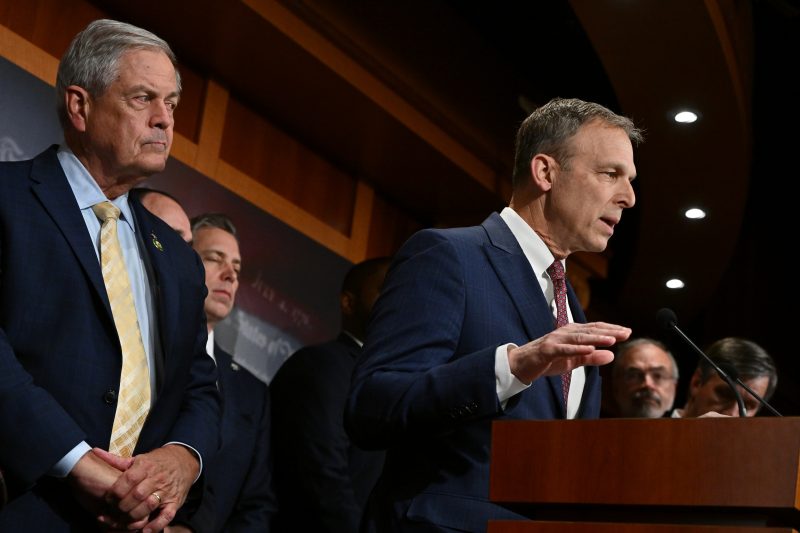Under a sweltering July heat outside the Capitol, members of the House Freedom Caucus devoted a half-hour news conference to lambasting their Republican colleagues for supporting a bipartisan debt ceiling deal that they argued did nothing to curb spending or the deficit.
“Everyone who voted for that bill essentially kept in place the Biden agenda,” Rep. Bob Good (R-Va.) said a month after the deal became law, adding that the Freedom Caucus “was committed to using every tool in our disposal” to get to a lower top-line number.
At issue was the spending cap to fund the federal government for the upcoming fiscal year. Months earlier, House Republicans had passed a Freedom Caucus-approved proposal that would have forced Congress to slash $350 billion in spending with a cap of $1.471 trillion for the 2024 fiscal year. But the bipartisan Fiscal Responsibility Act deal struck by President Biden and then-Speaker Kevin McCarthy (R-Calif.), that passed both chambers with overwhelming bipartisan support, codified a higher top-line number of $1.59 trillion.
Four months, two House speakers and two averted government shutdowns later, the Freedom Caucus abruptly announced on Wednesday that their staunch defense of the lower spending cap had evaporated for most members. They now supported the $1.59 trillion level after months of defying their Republican colleagues, who had begged them to acknowledge the spending cap as a win — it was still lower than what Democrats set when they controlled the House and the Senate — and help expedite the government funding process.
The turnaround was consequential: It clears the way for the House and Senate to start negotiations in hopes of striking a compromise on how to fund the government with looming deadlines in mid-January and early February. But the far-right flank’s acceptance came far too late for some House Republican colleagues, who expressed shock, anger and dismay over the time wasted on placating the Freedom Caucus.
“It could have saved ourselves some time,” Rep. Kelly Armstrong (R-N.D.) said flatly. The spending debate was a key component in the effort to remove Rep. Kevin McCarthy (R-Calif.) as speaker of the House in October, which left the chamber paralyzed and without a leader for three weeks.
Leaders in both parties and chambers have not declared yet whether $1.59 trillion will indeed be the cap for government spending until Sept. 30, 2024, but Democrats have called on House Republicans to abide by the top line codified in the debt ceiling deal. The Senate has marked up their bipartisan bills higher than the cap, but the expectation by appropriators was that both chambers would negotiate to ensure the funding bills met the agreed upon number.
“It’s frustrating,” said Rep. Mike Garcia (R-Calif.), a vulnerable incumbent who serves on the House Appropriations Committee. “But I think it’s actually an encouraging sign that … they’re actually negotiating and, you know, conditions around that are reasonable.”
But several McCarthy allies in particular were flabbergasted when they heard about the Freedom Caucus’s change of heart, privately expressing “outrage,” as one member put it, over the epiphany many had tried to force earlier in the year.
“What this goes to show is that everything that’s been happening over the last few months is based entirely on ignorance or lack of information or understanding,” said another McCarthy ally, who spoke on the condition of anonymity to discuss internal party tensions, about the far-right flank. “They’re just a bunch of idiots.”
Freedom Caucus members said the calculation has more to do with timing, blaming McCarthy for not adhering to their demands earlier in the year. They also argued that they came around after recognizing the Senate had marked up their appropriation bills to a significantly higher level, making $1.59 trillion a realistically achievable cut to current levels. Moderate Rep. David Joyce (R-Ohio), who serves on the Appropriations Committee, said that the Senate overshooting the codified top line and House Republicans marking up their bills under it always meant that the two chambers would likely land back at the number agreed to by McCarthy and Biden.
But some far-right members’ openness to the $1.59 trillion level doesn’t guarantee support if appropriators simply mark up legislation to that number. There is a general consensus that the House and Senate cannot exceed that number, which would force them to then consider supplemental spending on foreign democracies and disasters at home. Others also want the appropriations bills to include House Republicans’ border security bill or funding for Israel, publicly threatening that they will reject a multifaceted national security proposal in the Senate that is meant to coax House Republicans to support more funding for Ukraine.
“No more gimmicks. Most of the House voted for it. Most of the Senate voted for it. That’s where we have to be. Don’t be adding stuff on to it,” Freedom Caucus Chair Scott Perry (R-Pa.) said. “Let’s write the appropriations bills, let’s get the spending bills right. Let’s set that as the number. And then when we do that, let’s start conferencing bills.”
Conversations with Speaker Mike Johnson (R-La.) and pragmatic colleagues helped move the Freedom Caucus to relent, according to multiple Republicans familiar with the talks. Johnson had relayed to Freedom Caucus members in several meetings that a top-line number needed to be agreed to by the four Senate and House leaders — himself, Senate Majority Leader Charles E. Schumer (D-N.Y.), Minority Leader Mitch McConnell (R-Ky.) and House Minority Leader Hakeem Jeffries (D-N.Y.) — so both chambers could begin negotiating in an effort to either pass a full-year funding plan and avoid a government shutdown or begin implementing an automatic one percent cut across all federal departments, a condition added to the debt ceiling deal.
Not all members of the Freedom Caucus are on board. Rep. Andy Biggs (R-Ariz.) has always preferred reducing spending to 2019 pre-pandemic levels and believes that Republicans should use the upcoming fiscal deadlines to demand more, suggesting that a shutdown could be worth it if it extracts concessions on border security.
“This is absolutely unsustainable. We’re heading off the cliff,” he said. “If you give [Democrats] pretty much everything that they want, you will never entice them, persuade them, leverage them into giving us the border security we need.”
How to fund the government has been the central issue that has tested House Republicans in their majority. While they all agree with wanting to reduce spending, they have been plagued with disagreements on the way in which to do so.
Members of the Freedom Caucus first made their intentions clear to McCarthy during his 15-ballot speakership election in January. They claim that McCarthy promised to cap spending at pre-pandemic levels for nondefense discretionary spending behind closed doors to earn their support, though those reported promises were never written down or released publicly.
McCarthy largely agreed to a number of the far-right’s demands, particularly when House Republicans’ debt ceiling proposal incorporated all of the Freedom Caucuses’ main requests. But when Republicans’ partisan plan was rejected in negotiations with the Biden administration, Rep. Chip Roy (R-Tex.) passionately declared that a “breach” in trust had been committed by McCarthy.
Days after the eventual bipartisan debt deal was signed into law in early June, 11 furious far-right lawmakers blocked a procedural hurdle on noncontroversial bills that prevented the House from considering any legislation for a week. McCarthy then relented and directed the House Appropriations Committee to mark up all funding bills to the levels the Freedom Caucus demanded, breaching the deal made with Biden. The decision rankled appropriators, who were now assigned the daunting task of making significant cuts that also teed up tough votes for vulnerable Republicans serving on the committee.
“We were in meetings that were hours long debating that $1.471 [trillion] number where they said we’d never go up to $1.59 [trillion],” a vulnerable Republican said about Freedom Caucus colleagues. “I’m glad we got there but my gosh, why? Why do this? We wasted 10 weeks here for what?”
The real test for Republicans and McCarthy began in September with just weeks to fund the government before a possible shutdown, kicking off a tumultuous 10 weeks. Three members of the Freedom Caucus — Perry, Roy and Rep. Byron Donalds (R-Fla.) — along with three lawmakers from the conservative Main Street Caucus proposed a short-term deal that would slash spending by one percent until October, included Republicans’ border security bill and capped full-year funding at $1.59 trillion. It was the first break within the Freedom Caucus that showed some members, though not the majority, were willing to strike a deal at the higher top line. It was almost immediately rejected.
Unable to strike a deal within his conference after providing myriad options, McCarthy ultimately averted a government shutdown at the 11th hour by passing a clean extension of current funding levels with the help of House Democrats. Three days later, he became the first speaker of the House to be ousted ― targeted by several members for having violated the far-right’s demand that he not rely on Democratic help to avert the shutdown like he had for the debt ceiling deal.
After three weeks and three failed attempts to elect a speaker, Republicans unanimously chose Johnson, a staunch member of the far-right flank. But becoming second-in-line to the presidency and meeting critical deadlines to avert a second possible shutdown forced Johnson to mimic McCarthy and pass a clean extension of current fiscal levels to avoid a shutdown in mid-November until early next year with help from Democrats. Though he adopted the Freedom Caucus’s two-deadline approach to the extension, they fired the same warning shot as they had months earlier — sinking a procedural vote for a long-term appropriation bill.
So far, members of the far-right continue to give Johnson the benefit of the doubt, even though they are trying to stress what their expectations are moving forward. Johnson made clear to Republican senators this week that the House prefers passage of their border security package as part of the broader national security bill and that the Senate should take up the House’s supplemental Israel proposal.
“What a great thing to have Mike in there because you trust what he says. You trust when he goes back to Schumer that he will lay out what he believes and it comes from us,” Rep. Ralph Norman (R-S.C.) said after meeting with Johnson early Friday.
Still, not all members are lauding Johnson, and instead are critical that he continues to listen to the far-right’s demands. Rep. Max L. Miller (R-Ohio), who is Jewish, claimed Johnson “screwed up” by tying Israel aid to IRS funding cuts that do not offset the costs of the legislation as Republican leaders and the Freedom Caucus claim.
“I’m sure a lot of people are going to be upset, but they only have one person to blame and his name is Speaker Johnson,” Miller said about possibly voting in support of a Senate funding bill that includes Israel aid. “I’m saying the quiet part out loud. There’s over 120 members within [the House] that feel just like I do. Except I’m at the point now, where the American people need to know what’s going on behind closed doors of Congress.”
Jackie Alemany and Leigh Ann Caldwell contributed to this report.







































